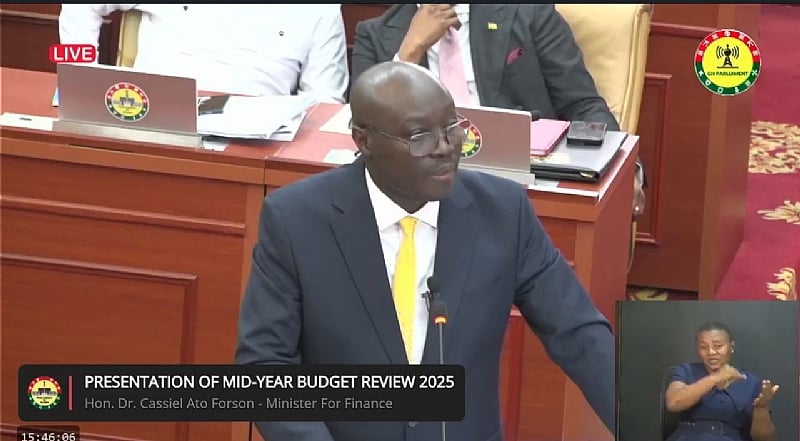Finance Minister Dr. Cassiel Ato Forson delivered the 2025 Mid-Year Budget Review, highlighting significant strides made by the Mahama administration in restoring Ghana’s economic stability within just 200 days of assuming office. He emphasized the administration’s swift and decisive interventions, which have effectively brought clarity, certainty, stability, and purpose back to the nation’s economic policy. The Minister underscored that this recovery is not merely confined to statistical projections but is tangibly experienced by ordinary citizens, businesses, and investors alike. He pointed to tangible evidence of this turnaround, citing noticeable improvements across several key macroeconomic indicators.
The rapid stabilization of the Ghanaian economy, as posited by the Minister, can be attributed to a combination of factors, including prudent fiscal management, enhanced transparency in government operations, and strategically targeted investments in social programs and infrastructure development. These measures have collectively contributed to a marked improvement in the country’s economic outlook, instilling renewed confidence both domestically and internationally. The Minister’s presentation served to reinforce the government’s unwavering commitment to these policies and to further consolidate the gains achieved thus far. The mid-year review also provided an opportunity to outline the government’s future economic plans and strategies for sustained growth.
One of the key indicators of the economic turnaround highlighted by Dr. Forson was a significant drop in the inflation rate. High inflation had been a persistent challenge for the Ghanaian economy, eroding purchasing power and hindering economic growth. The government’s policies, however, have successfully curbed inflationary pressures, bringing much-needed relief to consumers and businesses. This achievement reflects the effectiveness of the government’s fiscal discipline and targeted interventions in managing price stability. The decline in inflation is a crucial factor in restoring macroeconomic stability and creating a conducive environment for investment and economic expansion.
Another positive development noted in the budget review was the resurgence of the Ghanaian cedi. The currency had previously experienced significant volatility, depreciating against major international currencies. This depreciation had negatively impacted the cost of imports and contributed to inflationary pressures. The government’s policies, however, have fostered stability in the foreign exchange market, leading to a strengthening of the cedi. This improved exchange rate bolsters investor confidence, reduces import costs, and supports overall economic stability. The cedi’s resurgence is a testament to the effectiveness of the government’s economic management and its commitment to maintaining a stable currency.
The Minister also highlighted the growth in Ghana’s international reserves. These reserves are essential for maintaining the country’s ability to meet its external obligations and defend the value of its currency. The increase in reserves indicates a strengthening of the country’s external position and enhances its resilience to external shocks. This improved reserve position provides a buffer against economic uncertainties and strengthens the country’s credibility in international financial markets. The growth in reserves is a clear sign of the positive impact of the government’s economic policies.
Furthermore, the budget review pointed to better-than-expected GDP growth in the first quarter of 2025. This robust growth signifies a revitalization of the Ghanaian economy and underscores the effectiveness of the government’s policies in stimulating economic activity. Positive GDP growth is essential for job creation, poverty reduction, and overall economic development. The strong first-quarter performance sets a positive trajectory for the remainder of the year and reinforces the government’s commitment to achieving sustainable economic growth. This performance also signals a return of investor confidence in the Ghanaian economy, which is crucial for attracting foreign investment and supporting long-term economic development.


